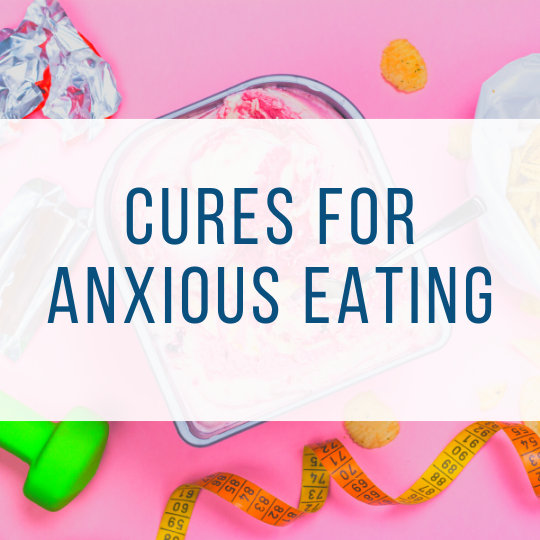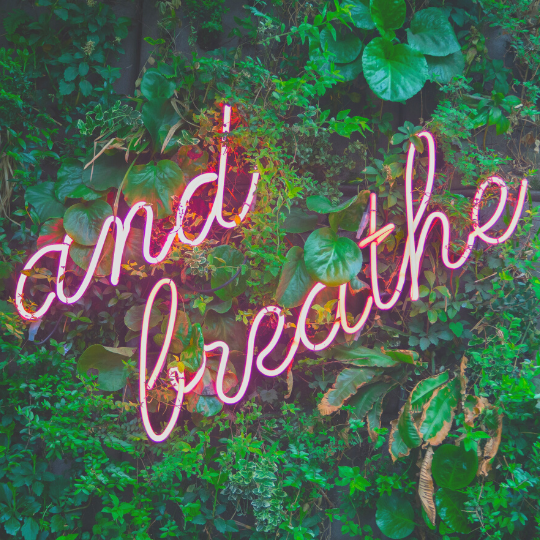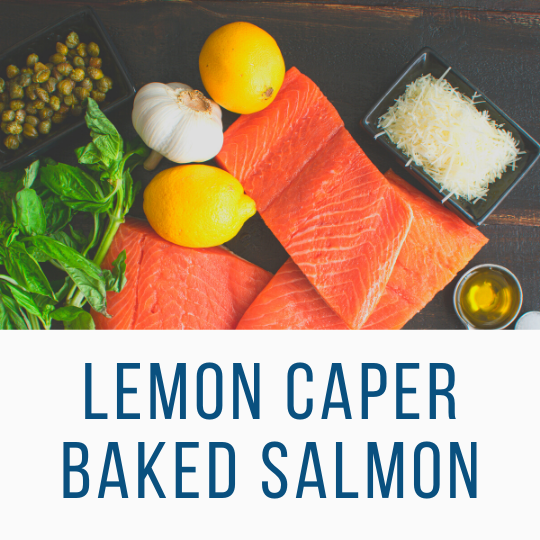Feeling anxious and stressed? Grab a bag of chips, cookies, or candy to melt the worries away. However, after you finish eating, you don't feel any less stressed than you did before. Actually, you feel even more stressed because now you feel guilty for overeating, and you are too tired to exercise.
Does this sound familiar?
Over the past few months, this is a common scenario many clients have shared. With so many unknowns in the world these days; it's not surprising to see an increase in stress and anxiety eating. The truth is, foods high in sugar and fat can bring temporary comfort and relief, however, it's not a long term solution. The cycle will most likely continue and can be detrimental to your overall health and well-being.
This month I'm sharing foods and lifestyle tips to help you decrease anxiety and stress during this very uncertain time.
-Stephanie
|
|
|
7 Food Cures to Reduce Anxious Eating
|
 Add fermented foods to your daily food regime. Naturally rich in probiotics, fermented foods contain healthy bacteria that help reduce the symptoms of anxiety. Add fermented foods to your daily food regime. Naturally rich in probiotics, fermented foods contain healthy bacteria that help reduce the symptoms of anxiety.
Real-life tip: Consume foods rich in probiotics such as yogurt, Keifer, kombucha, tempeh, miso, kimchi, and sauerkraut daily.
Eat foods rich in omega-3 fatty acids. The omega-3 fatty acids, EPA and DHA, help regulate serotonin and dopamine levels, promoting healthy brain function. While the specific amount of omega-3 each individual needs varies, 1 to 2 g/day is a general recommendation.
Real-life tip: Salmon, cod liver oil, flaxseeds, chia seeds, and walnuts are excellent ways to boost your omega-3 intake.
Empower yourself with protein. Starting your day with a high protein breakfast has been found to decrease overeating and snacking later in the day. Ensuring your meals and snacks are rich in protein can help you stay full longer, stabilize blood sugar levels, and prevent overeating.
Real-life tip: Begin your day with eggs and oatmeal for a protein and fiber-rich breakfast! Boost your protein from plant sources such as beans and nuts.
Soak up vitamin D. Research continues to show that time in nature can improve one's mood and decrease stress and anxiety. According to the Journal of Affective Disorders, being deficient in vitamin D can amplify existing mood disorders.
Real-life tip: Spend at least 15 - 30 minutes a day soaking up fresh air and sunshine. If you’re struggling with depression or anxiety, you may benefit from more time outdoors.
Magnify your magnesium intake. Did you know that magnesium is one of the seven essential macrominerals involved in more than 600 reactions in your body? The average adult needs approximately 300 - 400 mg of magnesium a day, and yet many people are not meeting this requirement! While more research is still required, magnesium may help decrease anxiety and other mood disorders.
Real-life tips: Delight yourself with foods rich in magnesium such as dark chocolate, leafy greens, avocados, legumes, whole grains, nuts, and seeds.
Limit caffeine and alcohol intake. While caffeine is a stimulant and alcohol is a depressant, both can increase feelings of stress and anxiety. If you're experiencing a heightened state of emotional distress, limit or avoid caffeine and alcohol.
Real-life tip: Discuss with your healthcare provider if your caffeine and alcohol intake could be increasing your feelings of stress and anxiety. Replace caffeine and alcohol with herbal caffeine-free tea, mocktails, or your favorite sparkling water.
Calm down with chamomile. Chamomile is a herb associated with naturally helping the body relax, resulting in reduced anxiety and inducing sleep.
Real-life tip: End your day by sipping on chamomile tea. If you are not a tea drinker, there are chamomile supplements. Always talk with your healthcare provider before taking any supplements.
|
|
|
Lifestyle Tips to Decrease Stress and Anxiety:
|
 Avoid restricting calorie intake. Often being restrictive with food intake or not taking in enough calories can lead to binging or overeating. During stressful times it is even more critical to avoid restrictive eating. Research continues to show that restrictive diets are ineffective for long term weight loss and can harm overall physical and mental health. Avoid restricting calorie intake. Often being restrictive with food intake or not taking in enough calories can lead to binging or overeating. During stressful times it is even more critical to avoid restrictive eating. Research continues to show that restrictive diets are ineffective for long term weight loss and can harm overall physical and mental health.
- Keep a food and mood journal. Record what you are eating and also how you are feeling. By identifying emotional triggers, you can help reduce binge eating.
- Slow down and practice mindful eating. Mindful eating can help you feel fuller longer and decrease cravings.
- Drink more water. Being dehydrated not only impacts energy and hunger but can also lead to mood alterations. If you feel uninspired with plain water, try adding a few slices of fresh fruit to boost its flavor!
- Work it out. It's no secret that exercise is a natural way to combat stress and reduce anxiety. If you are feeling stuck or in a rut, start by taking a walk outside or search YouTube for new motivation.
- Sit back and breathe. The simple act of stepping back to take a few deep breaths can help clear your mind and reduce feelings of anxiousness. By creating a habit to practice deep breathing more frequently, you will make better decisions regarding food and how you practice self-care.
|
|
Featured Recipe
Lemon Caper Baked Salmon
|
 Ingredients: Ingredients:
4- 6-ounce Salmon Steaks
Pinch of salt
Black pepper to taste
1 lemon, sliced
1 bunch fresh basil (optional)
3 tablespoons capers
Instructions:
Preheat the oven to 350 degrees.
Line a sheet pan with aluminum foil. Place salmon on a sheet pan, skin-side-down, and season with salt and pepper. Top salmon with lemon slices, basil, and capers. Bake for 15 minutes.
Nutrition Information: 360 calories, 23 gm fat, 290 mg sodium, 1 gm carbohydrate, 35 gm protein
|
|
|
Be Inspired
|
|
"You don't have to control your thoughts. You just have to stop letting them control you." - Dan Millman.
|
|
|
About SO Nutrition
|
 Stephanie Leipprandt Ouellette, MBA, RDN, LD
Stephanie Leipprandt Ouellette, MBA, RDN, LD Stephanie has been working in the field of nutrition and dietetics since 1995. She earned a Bachelor of Science degree in Dietetics from Michigan State University, completed an Approved Pre-Professional Practice Program at Western Michigan University and earned a Master of Business Administration from Baker College. She’s been a Registered Dietitian Nutritionist since 1996 and licensed in Texas since 2007. In 2008, Stephanie earned her certification in Childhood and Adolescent Weight Management. Stephanie has extensive clinical & managerial experience, both in corporate settings and in the community. Now she wants to share her knowledge with you, because most (if not all) nutritional habits begin at home.
Stephanie and her family reside in Katy, Texas
|
|
| |
Copyright © 2020 Customized Nutrition Newsletters, All rights reserved.
|
|
| |
|
|